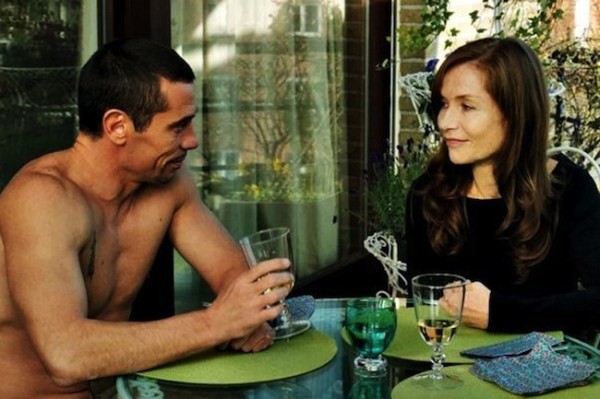Film Review: The 19th Annual Boston French Film Festival — “Love Is the Perfect Crime,” “Abuse of Weakness”
This year’s Boston French Film Festival (July 10 through 27) proffers a just-about 50-50 mix of male and female directors.

Maïwenn in a scene from “Love is the Perfect Crime,” one of the entries in the MFA French Film Festival.
By Betsy Sherman
July is Boston French Film Festival time at the Museum of Fine Arts. This year’s line-up of 20 new films (there’s also an Eric Rohmer revival) boasts a just-about 50-50 mix of male directors and female directors.
The opener, Love Is the Perfect Crime (L’amour est un crime parfait, showing July 10 at 7:30 p.m. and July 17 at 3 p.m.) is glistening and wide, but not very deep. It’s set during the winter in the Swiss Alps. Its main character, a middle-aged university professor named Marc, claims to feel the promise of spring in the air, yet his life seems to repel change, no matter the season. Marc’s limited bag of tricks consists of berating the students in his creative writing class for their lack of imagination, and of having sex with his female students as if this were a perk of the position (the movie may as well have been titled Arousing the Millennials).
An unexplained death at the beginning of the movie makes it partly a murder mystery. Directors Arnaud Larrieu and Jean-Marie Larrieu, who adapted the screenplay from a novel by Philippe Djian, kick the police procedural stuff to the curb in favor of a mishmash of dark comedy regarding Marc’s fraying life, commiseration with his mournful philosophizing, and an awe-inspiring widescreen portrayal of the nature that surrounds the modern architecture of the university. The alpine landscape that means so much to Marc contains peaks that challenge the human spirit, and crevasses that conveniently swallow up man’s mistakes.
The filmmakers’ wisest decision was casting the hardest-working man in French cinema, Mathieu Amalric (The Diving Bell and the Butterfly), as the eloquent and infuriating Marc. Lacking the craggy good looks one might associate with the campus Don Juan type, Amalric makes up for it with a disdain that works like a magnet among his young acolytes. The supporting cast includes some talented actors, but the characters they play are sketchily written. Karin Viard is astonishing, and not in a good way, as Marc’s sister Marianne, with whom he lives in the family chalet. A soft-spoken Sexy Librarian with a blonde Bettie Page hairdo, she exudes neediness (saying these siblings are co-dependent is an understatement). Marc needs rescuing from all these women, and finds a savior in the stepmother of a student who has disappeared. Almaric succeeds in making us believe that the rake genuinely falls in love, but by then the movie has spent so much time tickling us with feathers that we’re numb.

Kool Shen and Isabella Huppert in a scene from “Abuse of Weakness,” one of the entries in the MFA French Film Festival.
Catherine Breillat, one of the boldest voices in European cinema, returns with the compelling Abuse of Weakness (Abus de faiblesse, showing July 11 at 7:30 p.m. and July 19 at 12:30 p.m.). The director-writer adapted her autobiographical book of the same name, which recounts the aftermath of the 2005 stroke that paralyzed her left side and her subsequent association with well-known con man Christophe Rocancourt. Known for her untraditional casting choices, Breillat offered Rocancourt a role opposite Naomi Campbell in a project that ultimately fell through. Then, as he and Breillat collaborated on a screenplay of his life story, Rocancourt bilked the filmmaker out of approximately 850,000 euros. She accused him of taking advantage of her diminished condition, and he was tried and convicted under the French statute outlawing “abuse of weakness.”
Isabelle Huppert, as filmmaker-author Maud Schoenberg, immediately rises to the physical challenge of the role. Maud, blissfully nude under the sheets, succumbs to a series of violent contortions: she’s suddenly been betrayed by brain and body. In the hospital, and during rehabilitation, this feisty woman is completely dependent on others. But once she’s back in her funky, book-filled apartment, her creative juices begin to flow. Laughing gleefully as a brutish-looking criminal boasts of his swindles on a talk show, she decides she’s got to put him in a movie.
The rapper and (significantly) professional poker player Kool Shen aces his first major acting role as Vilko, the crook who’s been savoring his recent celebrity and is eager to be a movie star. In the initial meetings, Vilko reacts to Maud, who’s unlike any woman he’s ever met, with a good deal of masculine preening. Over time, the two become close in a way that’s touching: the relationship isn’t sexual, but it’s affectionate and by necessity physical. Maud walks with a cane, can’t use her left hand, and has trouble with balance. Vilko gets used to carrying her, and she gets used to being carried by him.
As the story unfolds, one innocuous object becomes the focal point: Maud’s checkbook. Vilko has debts. He asks Maud for a loan. She writes a check. He needs her to go in on a business venture with him. She writes a check. Repeat. Even after her good hand has been fractured, she torturously signs that check. Breillat presents this slow drain not as some kind of evil hypnosis, but as a paradox. Maud’s used to being a director, and we see her many decisions—in the pre-production for the film, in the renovation of her home and garden, even in the crafting of the coolest, toughest-looking Velcro-fastened boots ever made. Vilko is like water that deliberately wears away at the surface of a rock. Huppert’s expression is vacant as her hand makes its obligatory scrawl.
Abuse of Weakness is a fascinating, nicely restrained look at what in retrospect was a parasitic relationship. After her stroke, Breillat made a pair of films based on fairy tales. It will be interesting to view them again after learning about her encounter with a real-life monster.
Betsy Sherman has written about movies, old and new, for The Boston Globe, The Boston Phoenix, and The Improper Bostonian, among others. She holds a degree in Archives Management from Simmons Graduate School of Library and Information Science. When she grows up, she wants to be Barbara Stanwyck.
Tagged: Abuse of Weakness, Catherine Breillat, french film, Love Is the Perfect Crime, MFA French Film Festival
